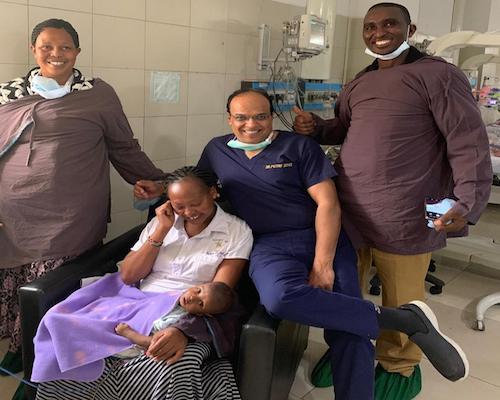Healthy Soch
New Delhi, March 28, 2019:
At the tender age of six months Emmanuel Lila Kamank, a Kenyan national, underwent open-heart surgery for a rare cyanotic congenital heart defect known as Taussig-Bing anomaly at Indraprastha Apollo Hospitals. Just four days after his birth, Emmanuel was diagnosed with this heart defect and as his condition worsened, he was referred to Apollo Hospitals, Delhi for surgery.
Dr. Muthu Jothi, Senior Consultant- Paediatric Cardiothoracic surgeon, Indraprastha Apollo Hospitals, New Delhi explains, “When Emmanuel came to Apollo, he was already cyanotic, which means that he had bluish discoloration of skin due to lack of oxygen in his blood. On examination, it was found that his respiratory rate was below normal at 20 breaths per minute. At the hospital, he suddenly underwent respiratory arrest. The attack was so severe that the child also had a cardiac arrest. His condition was pretty dire due to which he was put on ventilator and shifted to cardiac ICU.”
Dr. Jothi further stressed on the criticality of the baby’s condition, “The child was already diagnosed with Taussig-Bing anomaly, which is a malformation of the heart in which there is transposition of aorta to the right ventricle which in normal case should originate from left ventricle. At the same time, his pulmonary artery was also wrongly positioned into the right ventricle. This is called double outlet right ventricle defect. Upon further investigation, we found out that there was also an interrupted aortic arch (block in the aorta). On top of that, the child had large subpulmonary ventricular septal defect (VSD), atrial septal defect (ASD), and Patent ductus arteriosus (PDA), wherein ductus arteriosus, the blood vessel that is open when the child is inside the mother’s womb does not close due to this defect. In addition to all this, he also had a single coronary origin giving rise to right and left coronary arteries. The right coronary had a part inside the wall of the aorta which we call as intramural coronary artery. This makes it very difficult technically to relocate the coronary arteries into the new aorta. Needless to say, it was very high risk case with limited chances of success even with surgery. We devised a treatment plan for the baby, but informed his family about the 50-60% surgical risk associated with it. The family consented to the high risk and we decided to go ahead with the procedure.”
On 21st January 2019, the child underwent the surgery which was performed by Dr. Muthu Jothi and his team consisting of Dr. Manisha Chakrabarti, Senior Consultant, Paediatric cardiologist and Dr. Reetesh Gupta, Senior Consultant, Paediatric intensivist.
Explaining the complexity of the surgery, Dr. Muthu Jothi said, “The procedure was done under total circulatory arrest, which means that the entire blood in circulation in his body was drained into the heart lung machine. Before that we had to cool the child’s body to 16 degree Celsius. This is near freezing for the human body. We even put ice on the surface of his brain. Without circulation, we can keep the patient in this state for maximum of 45 minutes. Beyond that, there’s the risk of injury to the brain, spinal cord, kidneys and other organs. The total time Emmanuel was on total circulatory arrest was 30 minutes. During this time we repaired the aortic arch interruption by tying off and disconnecting the PDA blood vessel and connecting it to the aortic arch.
After doing this, we put the child again on the heart-lung machine and did the switch operation to put the blood vessels in their correct position. The intramural coronary artery was a very difficult condition where we had to mobilise this blood vessel and re-implant it into the new aorta. During this process if there’s an error of even half a millimetre, if it doesn’t go exactly where it needs to go then either coronary artery’s blood supply will be reduced, which can cause a heart attack. This repair was followed by closure of ventricular septal defect (VSD) and atrial septal defect (ASD). It was a very long surgery lasting almost 9 hours.”
The operation was a successful one and the baby was shifted to the ICU in a stable condition but with his chest still open, “The chest was kept open for 24 hours because there was a lot of swelling in the heart once we did the operation. Once the swelling came down and the child started passing urine post 12 hours after the operation, we closed the chest in the ICU. After this, child stayed for nearly a week on the ventilator,” Dr Muthu explained.
Baby Emmanuel slowly recovered and was discharged on the 17th day from the hospital.
The parents of the baby expressed their gratitude to the team at Apollo Hospitals who successfully operated on baby Emmanuel and treated him, “By the grace of God and the tireless efforts of Dr. Muthu Jothi and his team, Emmanuel is now well and has a long life ahead of him. Our prayers have been answered at Apollo and we cannot thank the doctors enough for their dedication. They kept us motivated throughout the treatment process.”
Baby Emmanuel has now gone back to Kenya with his family and is doing well.
healthysoch







